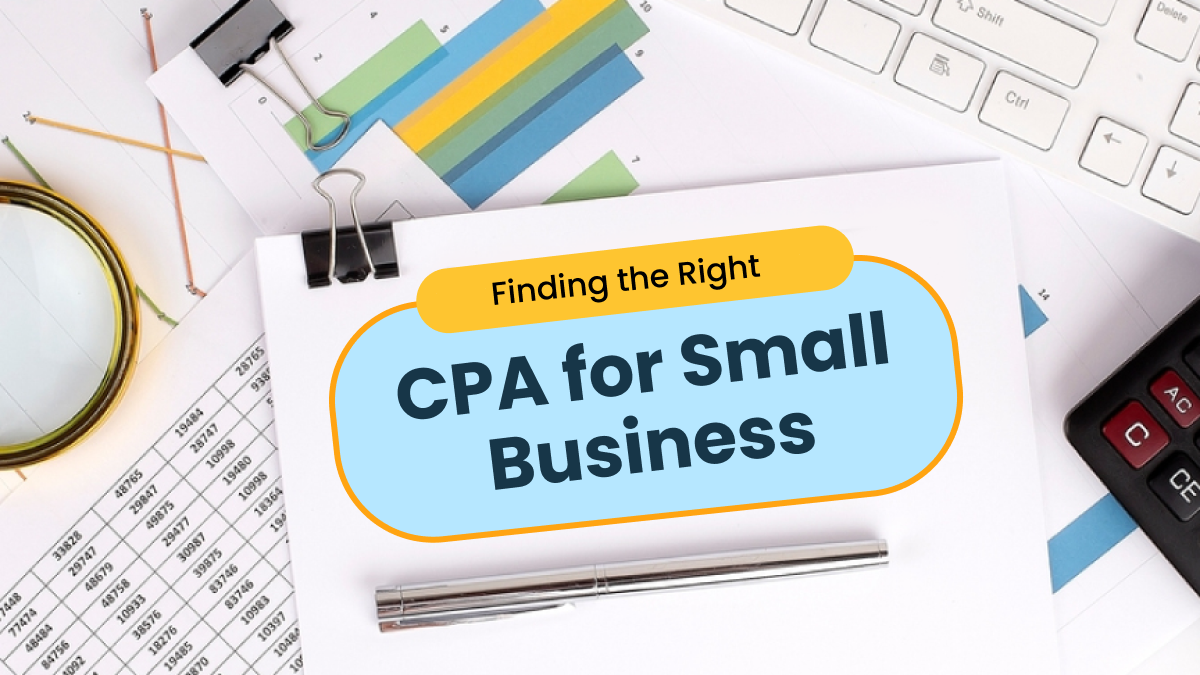Finding the right CPA for Small Business is like choosing a navigator for your journey through the world of finance and taxes. It’s a big decision that can affect how well your business grows and how smooth your financial path is. The right CPA can be a trusted guide, helping you make smart choices and avoid problems. They can save you time and money, giving you more freedom to focus on what you love about your business.
This guide is your first step toward finding that perfect match.
We understand that you might not be a financial expert—that’s why you’re looking for a CPA! So, we’ll break down the process in easy-to-understand terms, helping you feel confident and informed as you start your search. We’re here to show you how to find a CPA for Small Business who not only knows the numbers but also understands your business dreams and challenges. Let’s take this important step together and set your business up for financial health and success.
The Critical Role of a CPA in Small Business Success
The critical role of a CPA in small business goes far beyond tax filing and bookkeeping. This professional acts as a linchpin for financial stability and strategic growth, offering insights that can profoundly impact a business’s trajectory. By decoding complex financial data, a CPA in small business equips entrepreneurs with the clarity and foresight needed to navigate market uncertainties and capitalize on opportunities.
Strategic financial planning, nuanced tax strategy, and meticulous record-keeping are just a few areas where a CPA in small business proves indispensable. Their expertise helps to fortify a business against common financial pitfalls, ensuring compliance, enhancing profitability, and building a foundation for sustained growth. By aligning financial strategy with business goals, a CPA in small business becomes an invaluable ally in the quest for success.
Moreover, their objective analysis and seasoned advice can be critical during pivotal moments, such as business expansions, acquisitions, or even during challenging economic times. Ultimately, the involvement of a CPA in small business is not just about managing numbers—it’s about fostering a strategic partnership that supports the business’s overall vision and long-term aspirations.
A CPA for Small Businesses is not just an accountant but a pivotal figure who brings clarity, strategy, and insight into the financial mechanics of an enterprise. For small businesses, which often operate with limited resources and tight budgets, the guidance of a CPA can be the difference between mere survival and notable success. These professionals delve deep into the financial nuances of a business, providing not only compliance and tax strategy but also a robust framework for financial decision-making.
The expertise of a CPA for Small Businesses extends into areas crucial for any thriving enterprise—tax planning, financial reporting, and business strategy. Their adept analysis helps demystify complex financial landscapes, letting small business owners to make informed decisions that align with their company’s goals and growth aspirations. Additionally, their foresight can identify potential financial risks and opportunities, offering proactive solutions that can safeguard and propel a business forward.
In essence, a CPA for Small Businesses offers much more than fiscal oversight; they provide a strategic partnership that supports the business’s financial health and strategic objectives. By integrating their specialized knowledge with the business’s vision, CPAs ensure that financial stability is a cornerstone of the business’s success, fostering growth, innovation, and long-term viability.
Finding A Good CPA
Finding a good CPA, especially when seeking a CPA for Small Businesses, requires a strategic approach to ensure that you engage a professional who aligns with your business needs and goals. Here’s a step-by-step guide to aid your search:
- Understand Your Needs:Before embarking on your quest, delineate the specific services and support your business requires. Whether it’s tax advice, financial planning, or comprehensive accounting services, understanding your needs is crucial.
- Research and Recommendations:Leverage your network for recommendations. Trusted business associates, advisors, or online platforms can provide valuable insights. Research potential candidates, focusing on their experience with CPA for Small Businesses and their industry expertise.
- Check Credentials:Ensure the CPA is licensed and in good standing. Review their educational background, certifications, and professional affiliations.
- Interview Prospects: Arrange meetings to gauge their understanding of your industry, approach to financial management, and ability to provide strategic advice. Assess their communication skills and compatibility with your business culture.
- Evaluate References:Contact former or current clients to inquire about their experiences and the outcomes of the CPA’s work.
- Decision Time:After thorough evaluation, choose a CPA who demonstrates expertise, aligns with your business values, and offers the strategic partnership your business needs to thrive.
How to Assess the Qualifications and Credentials of a CPA
Assessing the qualifications and credentials of a CPA is a critical step in ensuring that you entrust your financial affairs to a competent and trustworthy professional. Here’s how you can thoroughly evaluate a CPA’s credentials:
- Verify Licensure:Ensure that the CPA holds a valid license to practice in your jurisdiction. This can typically be confirmed through the state’s board of accountancy website, which maintains up-to-date records on licensed CPAs.
- Review Education and Continuous Learning:A reputable CPA should have a strong educational background in accounting or a related field, along with a commitment to stay abreast of the latest industry developments and regulations.
- Evaluate Experience:The length and breadth of experience, particularly in your industry or sector, can provide valuable insights into the CPA’s capability to handle your specific financial needs.
- Check Professional Affiliations:Membership in professional organizations like the American Institute of CPAs (AICPA) signifies a commitment to the profession’s ethical standards and provides access to ongoing education and industry resources.
- Seek References and Testimonials:Client testimonials and peer references can offer additional perspectives on the CPA’s professionalism, expertise, and client service quality.
- Assess Communication Skills:Effective communication is vital. Ensure that the CPA can explain complex financial concepts in understandable terms and demonstrates attentiveness to your questions and concerns.
By meticulously evaluating these aspects, you can confidently select a CPA who not only meets the requisite professional standards but also aligns with your financial objectives and business ethos.
Estimated CPA Cost for Small Businesses
Understanding the CPA cost for small businesses is crucial for budgeting and financial planning. The investment in a CPA’s services can significantly impact your business’s fiscal health, providing not just compliance but also strategic financial guidance. The cost structure for a CPa for small businesses typically varies based on several factors, including the complexity of your financial needs, the CPA’s experience, and the geographical location.
- Scope of Services:Determine whether you require comprehensive accounting services, tax advice, financial planning, or a combination. The broader the scope, the higher the fee might be.
- CPA Expertise:Highly experienced CPAs or those with specialized knowledge in a particular industry might command higher fees but can offer invaluable insights and advice.
- Geographical Location:CPA fees can also vary significantly based on your business’s location, with rates in larger metropolitan areas typically higher than in smaller towns.
- Billing Structure: CPAs may charge by the hour, a flat fee per service, or a retainer for ongoing services. Understanding this structure will help you anticipate costs and negotiate terms.
Investing in a CPA for small businesses should be viewed not merely as an expense but as a strategic decision that can save money, mitigate risks, and foster growth. By carefully evaluating these cost factors, you can find a CPA whose services align with your business’s needs and financial capabilities.
Frequently Asked Questions
How can I verify a CPA’s credentials and background?
To verify a CPA’s credentials and background, start by checking their licensure status through your state’s Board of Accountancy, which can usually be done online. Additionally, inquire about their educational background and professional experience, particularly with small businesses and within your industry. You can ask for references from their past clients to gauge their performance and reliability.
What services can a CPA provide for my small business?
A CPA can provide a comprehensive range of services for your small business, including tax preparation, financial statement preparation and analysis, and ensuring compliance with state and federal regulations. They can also offer business advisory services, such as financial forecasting, budgeting, and business valuation. Additionally, a CPA can assist with internal controls evaluation and provide guidance on financial strategy and risk management to help your business grow sustainably and efficiently.
How can I find a CPA who is familiar with my industry?
To find a CPA familiar with your industry, start by seeking recommendations from colleagues, industry associations, or small business networks. Check the CPA’s website or online profile for information about their industry specialties or case studies demonstrating their expertise. Additionally, during initial consultations, ask potential CPAs about their experience with similar businesses and their understanding of industry-specific financial challenges and opportunities. This due diligence will help ensure you select a CPA well-versed in your industry’s nuances.
How should I prepare for my first meeting with a potential CPA?
To prepare for your first meeting with a potential CPA, gather and organize your financial statements, tax returns, and other relevant financial documents. Be ready to discuss your business’s financial goals, challenges, and any specific areas where you seek guidance. It’s also beneficial to prepare a list of questions to assess the CPA’s expertise, communication style, and compatibility with your business needs. This preparation will facilitate a productive dialogue and help you evaluate whether the CPA is the right fit for your business.


